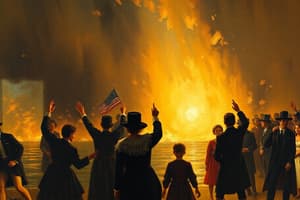Podcast
Questions and Answers
During which stage of the French Revolution did the Reign of Terror take place?
During which stage of the French Revolution did the Reign of Terror take place?
- Revolutionary Stage (1789–1792)
- Radical Stage (1792–1794) (correct)
- Thermidorian Stage (1794–1799)
- None of the above
What concept was established by the French Revolution and became influential in modern political thought?
What concept was established by the French Revolution and became influential in modern political thought?
- Popular sovereignty (correct)
- Plutocracy
- Monarchy
- Oligarchy
Which event marked the beginning of the French Revolution's Revolutionary Stage?
Which event marked the beginning of the French Revolution's Revolutionary Stage?
- Reign of Terror
- Fall of Robespierre
- Abolition of feudalism
- Drafting of the Declaration of the Rights of Man (correct)
What significant social change occurred as a result of the French Revolution?
What significant social change occurred as a result of the French Revolution?
Which stage of the French Revolution sought stability and order after Robespierre's fall?
Which stage of the French Revolution sought stability and order after Robespierre's fall?
How did the French Revolution contribute to shaping modern democracies?
How did the French Revolution contribute to shaping modern democracies?
Which of the following was NOT a key factor that contributed to the French Revolution?
Which of the following was NOT a key factor that contributed to the French Revolution?
What philosophical movement played a significant role in inspiring revolutionary thought and action?
What philosophical movement played a significant role in inspiring revolutionary thought and action?
Which of the following events is NOT mentioned as a significant event during the French Revolution?
Which of the following events is NOT mentioned as a significant event during the French Revolution?
How did the wealth gap between the nobility and the rest of society contribute to the French Revolution?
How did the wealth gap between the nobility and the rest of society contribute to the French Revolution?
Which of the following philosophers is NOT mentioned as a key figure who inspired revolutionary thought and action?
Which of the following philosophers is NOT mentioned as a key figure who inspired revolutionary thought and action?
What was the outcome of the French Revolution in terms of the government system?
What was the outcome of the French Revolution in terms of the government system?
Flashcards are hidden until you start studying
Study Notes
French Revolution
The French Revolution was a period of radical social and political upheaval from 1789 to 1799, during which King Louis XVI was executed, the monarchy abolished, and the country transformed into the French Republic. This era was marked by significant events such as the Storming of the Bastille, the Reign of Terror, and the rise of Napoleon Bonaparte as a major world power.
Causes and Ideas Behind the French Revolution
The French Revolution was primarily driven by five key factors:
- Social Unrest: The country's population grew rapidly, causing poverty and unemployment among the common people. In addition, the wealth gap between the nobility and the rest of society widened, leading to increasing resentment.
- Political Instability: Dissatisfaction with government policies, particularly those regarding taxes and the influence of the church on public life, contributed to growing calls for reform.
- Economic Crisis: France faced severe economic difficulties, including inflation, high debts due to continuous wars, and food shortages.
- Enlightenment Ideas: Philosophies of individual rights and liberty spread through Europe, influencing revolutionaries to demand more freedom and equal representation.
- Leadership and Inspiration: Key figures like Jean-Jacques Rousseau, Voltaire, and Montesquieu inspired revolutionary thought and action.
Stages of the French Revolution
The French Revolution can be broken down into three distinct stages:
- Revolutionary Stage (1789–1792): Led by the bourgeoisie, this stage featured widespread demands for civil liberties and constitutional reform, culminating in the fall of the Bastille and the drafting of the Declaration of the Rights of Man.
- Radical Stage (1792–1794): The emergence of the radical Jacobin party led to the Reign of Terror, a period characterized by mass purges and executions aimed at suppressing counterrevolutionary forces.
- Thermidorian Stage (1794–1799): After the fall of Robespierre, who had become increasingly tyrannical, the French people sought stability and order under the direction of moderate leaders like Paul Barras and Emmanuel-Joseph Sieyès.
Impact of the French Revolution
The French Revolution had profound effects on both France and Europe:
- Influence on Political Thought: It established the concept of popular sovereignty and nationalism, shaping modern political ideologies.
- Impact on Social Structure: The revolution led to significant changes in social norms and class structures, including the abolition of feudalism and the rise of secular society.
- Cultural Impact: It fostered a sense of national identity through shared symbols and rituals, such as the tricolore flag and Bastille Day celebrations.
- Legacy on Modern Democracies: The French Revolution played a crucial role in shaping modern democracy and freedoms we enjoy today.
Studying That Suits You
Use AI to generate personalized quizzes and flashcards to suit your learning preferences.




